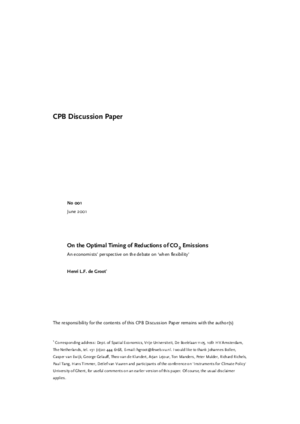July 20, 2001
On the optimal timing of reductions of CO2 emissions; an economists' perspective on the debate on "when flexibility"
Klimaatbeleid: de risico's van uitstel
Press release
In de klimaatdiscussie wordt vanwege onzekerheden en te verwachten technologische doorbraken vaak gepleit voor uitstel van beleid. Toch is er een aantal goede redenen om klimaatbeleid op de korte termijn te intensiveren.
We are sorry, unfortunately there is no English translation of this page.
Reducing the emission of greenhouse gases to reduce climate change is high on the policy agenda. Discounted costs of reduction are estimated to be substantial. They depend on the employment of various flexibility mechanisms that affect these costs.
One of these flexibility mechanisms is the so-called when-flexibility stressing the timing of policy measures aimed at reducing CO2-emissions. This paper surveys the arguments in favour of early and late reduction. By means of an illustration of some of the key-mechanisms, we discuss an applied analysis of optimal timing performed with the applied general equilibrium model DICE.
Authors
Henri de Groot
